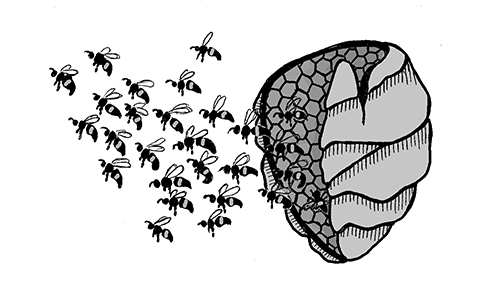All over the world, honeybee colonies are collapsing. This phenomenon, called Colony Collapse Disorder, happens when the colonies’ worker bees mysteriously disappear. For many years, scientists have been unable to determine the cause of these disappearances. Reports have suggested that the widespread use of pesticides may have something to do with colony collapse, but the exact cause remains unclear.
Where’s the honey?

All over the world, honeybee colonies are collapsing. This phenomenon, called Colony Collapse Disorder, happens when the colonies’ worker bees mysteriously disappear. For many years, scientists have been unable to determine the cause of these disappearances. Reports have suggested that the widespread use of pesticides may have something to do with colony collapse, but the exact cause remains unclear.
However, a recent study out of the University of Illinois may have determined the cause of CCD in bee colonies around the world.
The likely culprit: high-fructose corn syrup.
Over the years it’s become common practice for commercial beekeepers to feed honeybees high-fructose corn syrup so that their natural food source, honey, can be removed and sold.
Substituting chemically engineered HFCS for the honey that bees usually feed on weakens the bees’ immune systems and makes them more susceptible to disease and death. This hypothesis, while pointing a finger at a single contributor to CCD, may not fully account for the problem’s causes. It is, however, the closest we’ve come to explaining it.
With new concerns and questions regarding feeding bees HFCS, will this discovery shine new light on how humans are affected by the substance? Not only is HFCS used as commercial food for bees, it’s also added to practically every packaged and processed food that we eat.
HFCS is cheap, cheaper than sugar, so it’s everywhere. You’ll find it in myriad foods, including less obvious items like bread, condiments, energy bars and pasta sauce. For years it’s been the go-to substitute for table sugar (sucrose) in most U.S. food manufacturing.
Overexposure to high-fructose corn syrup and other unnatural sweeteners makes us less able to taste sweetness. In order for our taste buds to experience similar levels of sweetness we must consume larger amounts of sugar. Similar to the way our bodies metabolize alcohol and build tolerance for it, we build tolerance for HFCS when we eat foods that contain it.
You don’t need a scientist to tell you that eating large quantities of chemically engineered, complex-sugar-ridden, unnatural sweeteners is bad for your health. Yet with steadily increasing amounts of HFCS in the foods that we eat, diseases like obesity, heart disease, diabetes and other diet-related illnesses have increased to epidemic proportions. More and more people are being affected. It raises the question: Are we doomed to a similar fate as that of the honeybee?
Unlike the honeybee, however, which might not be aware of changes to its diet, we’re in control of what we put in our bodies. And we should be conscious of this.
HFCS and any of its unnatural sugary cousins are included in the ingredients list on a food’s packaging. Checking the ingredients before you buy something is an important step in reducing the amount of HFCS you consume, and in negating the potentially life-threatening risks it may pose to your health.
Making foods from scratch rather than buying them from the store will also limit the amount of added artificial sugars and syrups you consume, and you’ll be more aware of the ingredients that you put into your body. Food with fewer processed ingredients is better for you and will make you healthier and happier.
Reducing the amount of high-fructose corn syrup that you eat might make everything taste a lot blander. While that might be true for a while—a few weeks at the most—your body will adjust to the new levels of sweetness and your sense of taste will go back to normal.
Your newly reborn taste buds will be able to distinguish the more subtle flavors of your food, and in turn you won’t have to add as much seasoning. Foods that once seemed bland compared your sugary diet will now taste a lot more appealing, and you’ll be a lot healthier. Who wouldn’t want that?
And perhaps if we can lessen our dependence on artificial sweeteners and HFCS, we might be able to change how HFCS is used in other ways. We might even save some honeybee colonies.






